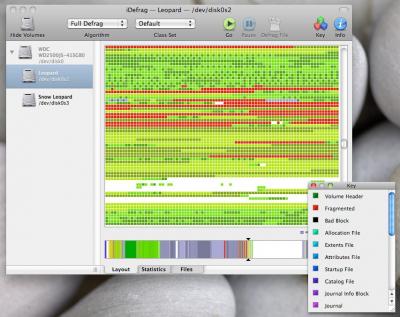

Manually defragging HFS+ hard disks was always a questionable activity, as Apple added background defragmentation to Mac OS X 10.2, released two years before Coriolis was even founded. While few doubt the performance benefits achieved immediately after defragging each of those, little attention has been paid to demonstrating more lasting benefits, which remain dubious. Different strategies and products have been used to tackle each of those, with varying degrees of success. Although solid-state media can have slight overhead accessing disparate storage blocks sequentially, this isn’t thought significant and attempts to address that invariably have greater disadvantages.įragmentation on hard disks comes in three quite distinct forms: file data across most of the storage, file system metadata, and free space. To read a fragmented file sequentially, the read-write head has to keep physically moving to new positions, which takes time and contributes to ageing of the mechanism and failure. This is because of their electro-mechanical mechanism for seeking to locations on the spinning platter they use for storage. This proved profitable until SSDs became more widespread and Apple released its APFS file system in High Sierra, forcing Coriolis shut down in 2019, when defragging Macs effectively ceased.Īll storage media, including memory, SSDs and rotating hard disks, can develop fragmentation, but most serious attention has been paid to the problem on hard disks. Coriolis was started in 2004, initially to develop a tool for non-destructive re-partitioning of HFS+ disks, but its founder Alastair Houghton was soon offering iDefrag, which became a popular defragging tool. The story of defragging on the Mac is perhaps best illustrated in the rise and fall of Coriolis Systems and iDefrag. Who now spends time every few weeks defragging anything? Even if you didn’t believe in the importance of defragging your files, you knew that you should defrag free space, and that rising fragmentation could seriously impair your Mac’s performance.

#Using idefrag software#
That’s why fragmentation of data has been so important in computer storage.Ĭast your mind back a few years, and one of the essential software utilities every serious Mac user had and used was something to defragment (defrag) their hard disks. If all its volumes are kept in sequence on a single shelf, that’s far quicker. If someone has tucked each volume away in a different location within the stack, assembling those you need is going to take a long while. When you need to consult several consecutive volumes of such a work, how they’re stored is critical to the task. Major reference works are often published in a series of volumes. Storage is only half a concept, its essential companion being retrieval.Ĭonsider a large library containing tens or even hundreds of thousands of books.


 0 kommentar(er)
0 kommentar(er)
